Marine Life & Conservation
Deptherapy Veterans help to guide coral reef conservation in Chuuk Lagoon
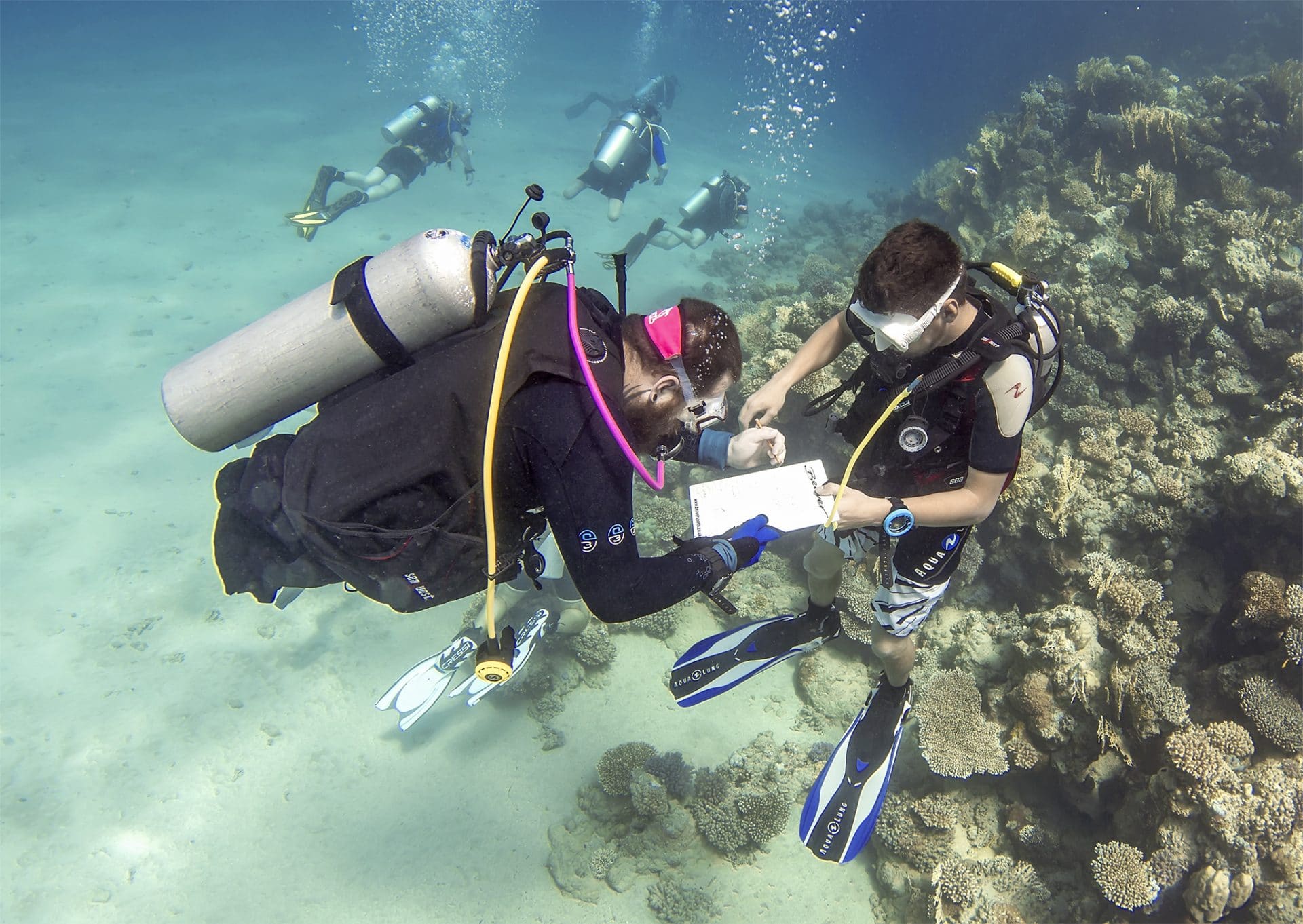
Back in August 2018, a team of UK Veterans from the charity Deptherapy & Deptherapy Education, supported by Coral Cay Conservation (CCC), headed to Chuuk Lagoon, Micronesia, to collect critical ecological data from the Shinkoku Maru, a shipwrecked World War II vessel.
The expedition was part of the wider effort by Deptherapy following the launch of their “Protecting our Oceans” campaign where the charity’s members ‘give back’ to the Oceans that have given so much to them. The aim of the campaign is to raise awareness of the plight of the world’s oceans and for Deptherapy programme members to make their own practical contribution to environmental protection.
Following extensive training at ROOTS Red Sea in May 2018, the Deptherapy team set out to undertake preliminary data collection protocols through SCUBA to ecologically map the fauna and benthic community residing on the Shinkoku Maru. The data, and subsequent report, downloadable below, are to be delivered to resource managers and government bodies in Chuuk lagoon, to provide greater ecological clarity and evidence to facilitate management practices.
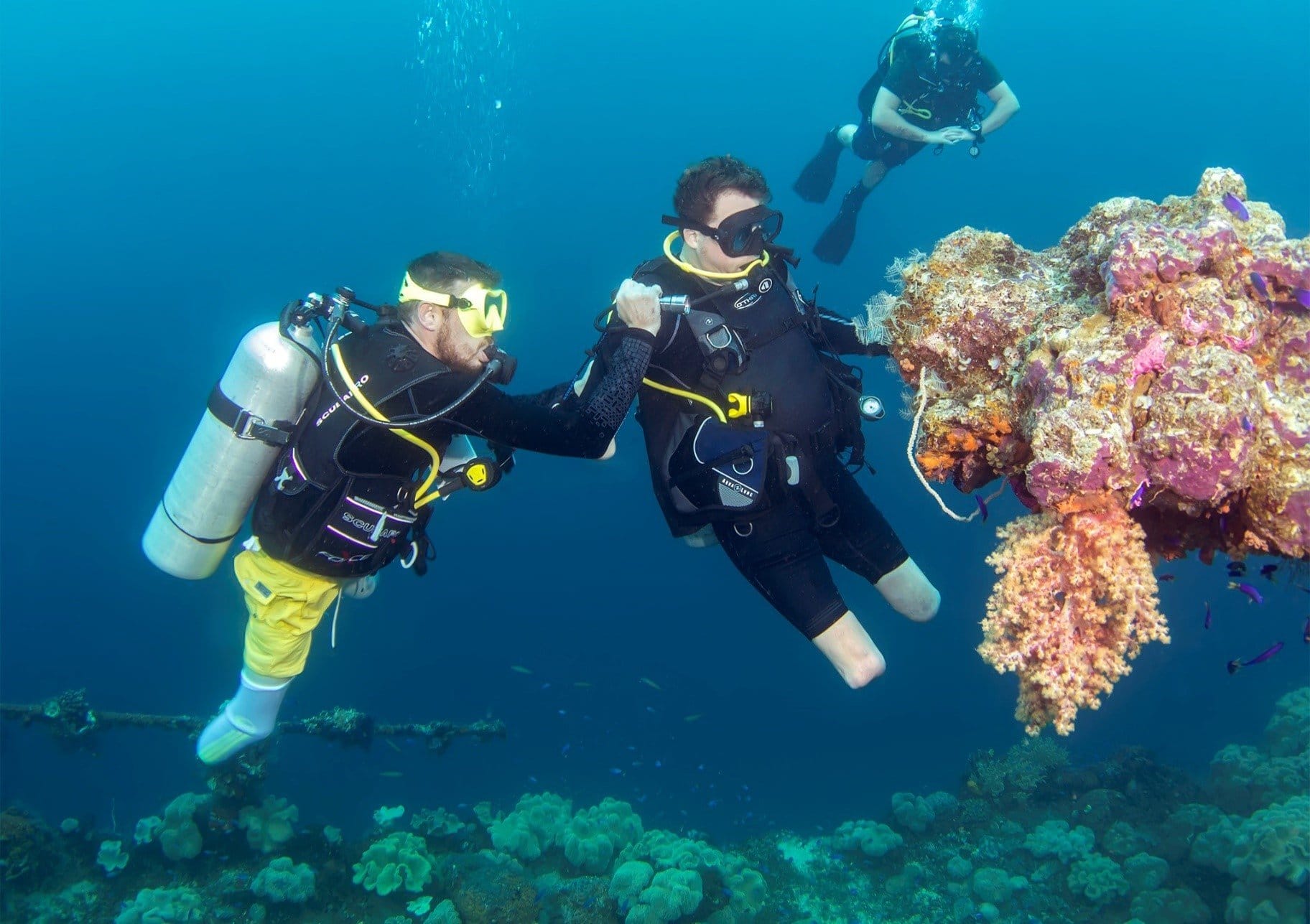
Deptherapy expedition members utilise their training to identify the colourful benthic fauna encrusting shipwrecks in Chuuk Lagoon – Photo: Dmitry Knyazev
The resulting scientific report from the expedition, authored by CCC’s Head of Science, Tom Dallison, and Ben Lee, and supported by Bear Grylls OBE, highlights, notably, that personnel suffering from various physical and mental ailments hold the ability to undertake such studies and that efforts to conserve our Oceans are accessible to all; overcoming the barriers associated with the rigorous physical demands of undertaking scientific data collection protocols through SCUBA.
“This is all about enabling Armed Forces’ Veterans to take action against the plights suffered by our Oceans. It is an inspired and brilliant collaboration and I am proud to be involved.”
Bear Grylls OBE – Global Adventurer
The coral reefs of the Pacific region, including the Federated States of Micronesia (FSM) and Chuuk Lagoon, are in relatively good health and account for approximately 25% of the world’s coral reefs making the region a diver’s paradise! Chuuk Lagoon is one of the worlds largest lagoons, composed of over 2,000km2 of coral reef and lagoon habitat (with an additional 200km barrier reefs), and is an important bio-geographical link between the Coral Triangle and other Pacific island groups. In addition to boasting some of the most extensive coral reef systems in Micronesia, Chuuk Lagoon also has a rich military history and is well known amongst the dive community as the lagoon hosts approximately 50-60 WWII shipwrecks, including 12 aircraft wrecks. One of these shipwrecks, and the wreckage assessed by Deptherapy team members, is the Shinkoku Maru which is a large Japanese oil tanker, found between 11 – 37m.
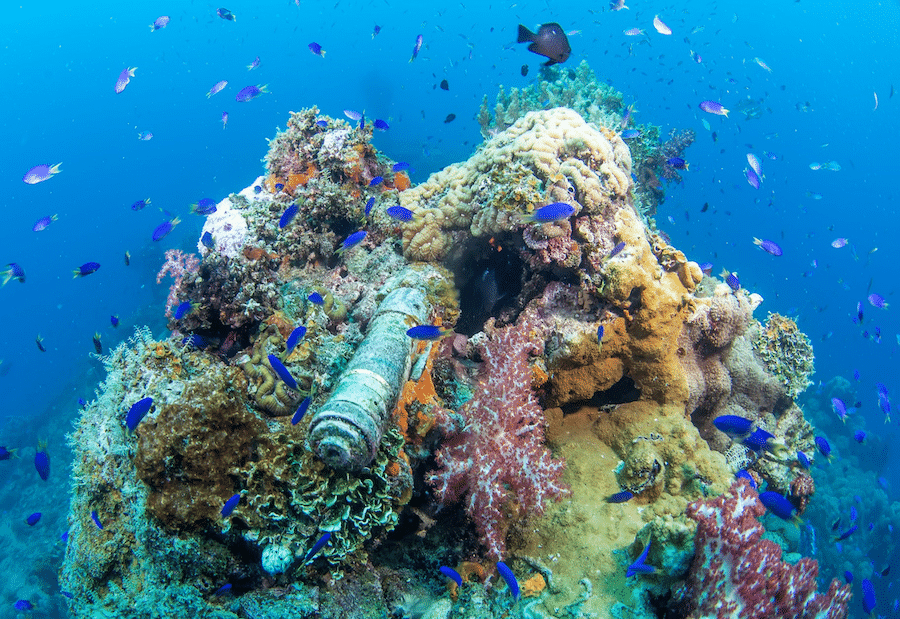
Benthic fauna that occupy many of the shipwrecks throughout Chuuk Lagoon – Photo: Dmitry Knyazev
In addition to the localised physical impacts to coral reefs caused by WWII, the lagoon has continued to experience severe environmental impacts through overfishing, pollution and rising ocean temperatures. Derelict vessels have often been utilised, or intentionally positioned to compensate for natural reef habitat loss and the loss of biodiversity, with evidence presenting high levels of diversity and fish biomass. However, evidence further suggests that, in fact, derelict vessels or shipwrecks support distinct reef-associated fish and benthic communities, possibly increasing an area’s resilience to environmental impacts. As such, Deptherapy’s assessment provides insight into the current ecological status of the Shinkoku Maru wreckage delivering incentives to the dive tourism industry and contributing to conservation efforts in the region.
In order to effectively assess the ecological community of the Shinkoku Maru, the wreck was split into two segments (Bow and Mid-section) to record fish diversity and abundance data. The wreck was then further split into three segments (Bow, Mid, Stern-section) to record the relative composition of benthic substrates that included Hard Coral and the respective lifeform (branching, massive and sub-massive etc.).
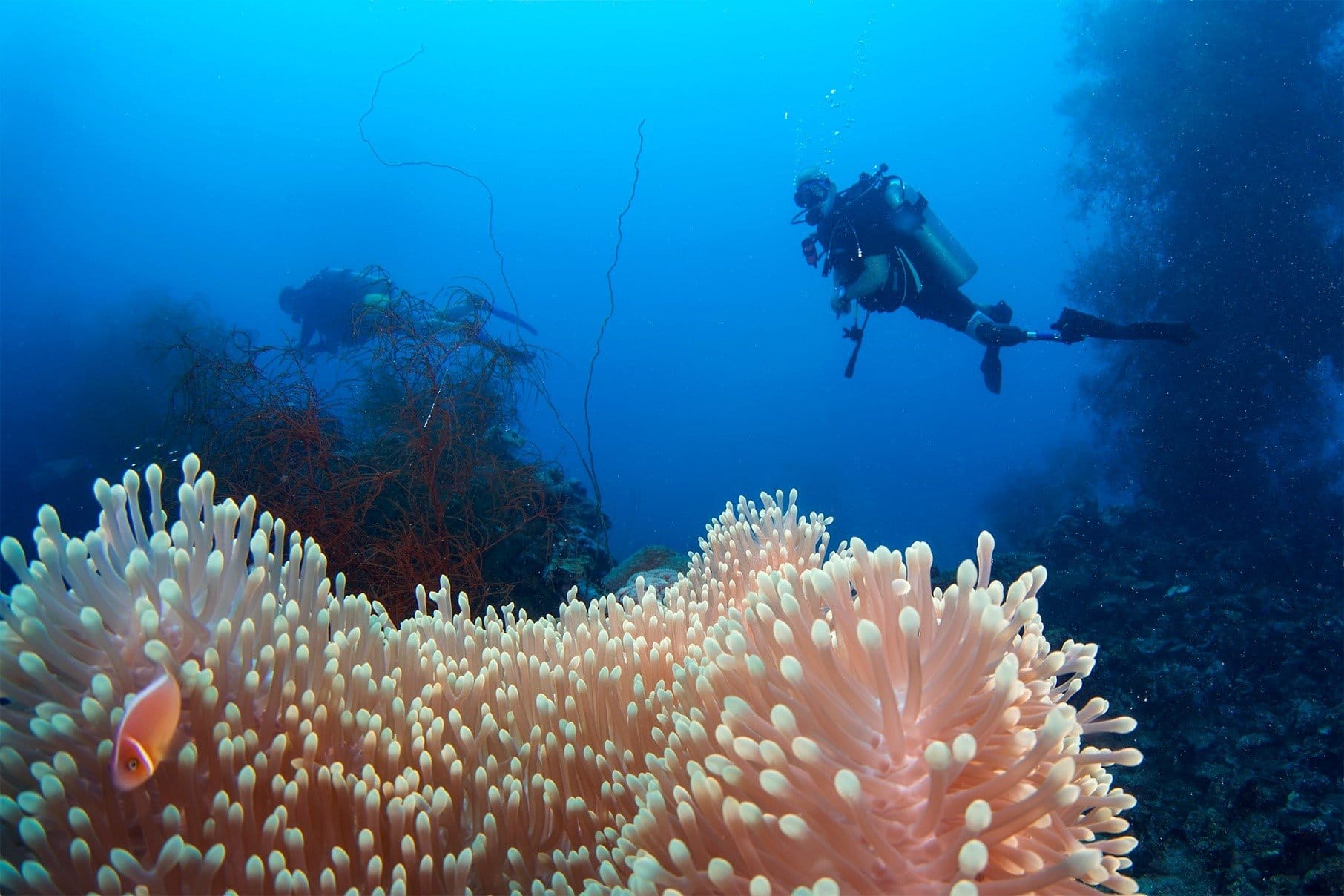
A Deptherapy team member with an adapted prosthetic limb diving in Chuuk Lagoon amongst the incredible biodiversity of the Pacific region – Photo: Dmitry Knyazev
Fishes were recorded as an exposure rate (per minute) by the Deptherapy team with Surgeonfish (Acanthuridae) recorded in the greatest abundance, followed by the Eastern Triangle Butterflyfish (Chaetodon baronessa). Throughout the assessment of the wreck, the survey team were also greeted by 12 Whitetip Reef Sharks (Triaenodon obesus) and one turtle!
The exposure rates and diversity of fishes was a positive find for Deptherapy with an abundance of marine life found across the entire wreckage. Following the sizing (cm) of each individual fish, it was found that species were dominated by smaller individuals, often an indication of overfishing as the majority of larger fish are removed by fisherfolk. The sizing of individual fishes enabled the Deptherapy team to calculate biomass (kg) which was found to differ between each section of the wreck indicating that specific areas were favoured by particular species, possibly driven by refuge or prey availability.
Assessments of the benthic community found that Hard Corals covered approximately 25% of the wreckage with a fairly homogeneous distribution across the entire wreck proving both positive from an ecological perspective and touristic potential as, due to the range of depths, divers of all abilities can enjoy the diverse corals of the vessel. The lifeform of the recorded Hard Coral was also found to be homogeneous further supporting the wreck’s accessibility and ecological value.
The abundance of a seemingly even distribution and diversity of Hard Corals on the Shinkoku Maru wreck, as well as the presence of specialised obligate corallivorous butterflyfish species and apex predators, such as Whitetip Reef Sharks, indicates that the community associated with the Shinkoku Maru wreck is in good ecological status, proving positive for the ecological characteristics and services of the survey area as well as for tourism. However, low levels of biomass and the dominance of smaller individuals should be investigated further.
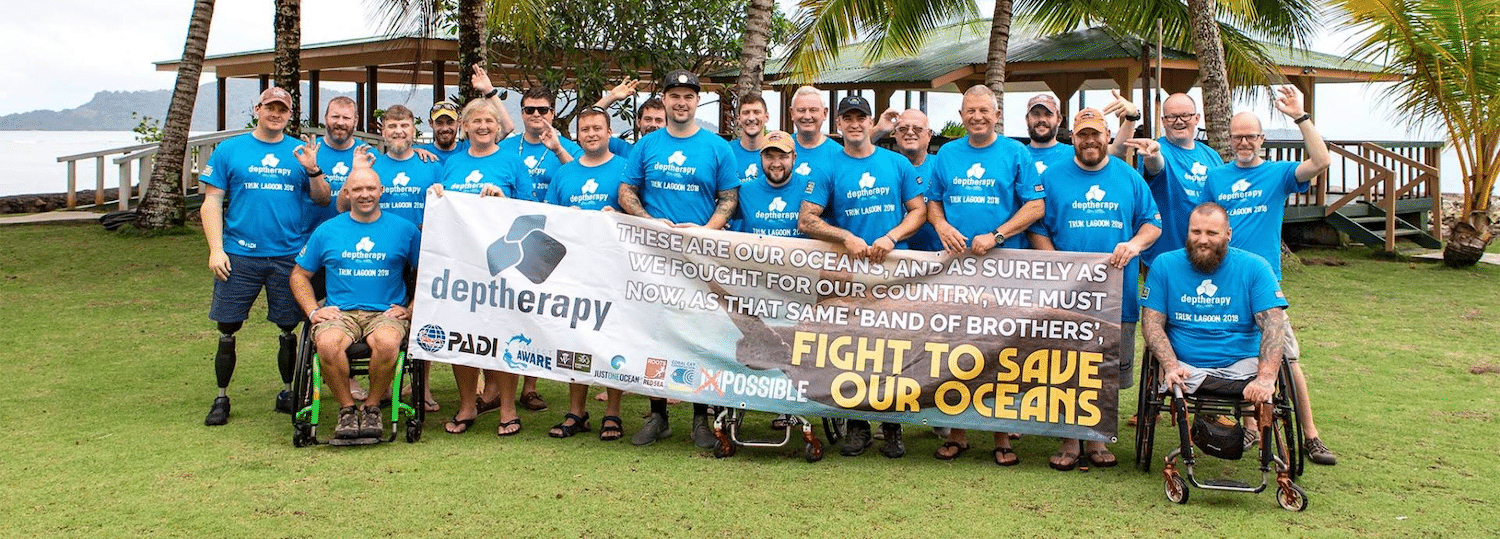
Deptherapy launch their “Protecting Our Oceans” campaign in Chuuk Lagoon, Federated States of Micronesia (FSM) in August 2018 – Photo: Dmitry Knyazev
Deptherapy Programme Member Ben Lee summarised the Chuuk Lagoon expedition and the achievement by the survey team:
“Completing the study was a massive achievement for the Deptherapy team, not only because we had accomplished our set aims in Truk [Chuuk], but also proved to the world that we, as disabled veterans, missing limbs and having mental health issues, can conduct our own conservation-orientated studies and help in the protection of our Oceans; a pledge we have made through our Protecting Our Oceans Campaign.”
Download the full report, entitled “Chuuk Lagoon, Micronesia; a 2018 Ecological Assessment of the Shinkoku Maru Wreck – 2019″. If you have any further queries about the report or the organisations involved, you can contact Coral Cay Conservation or Deptherapy for further information.
Blogs
The Ocean Cleanup Breaks 10,000,000 KG Barrier

The Ocean Cleanup, the global non-profit project, has removed a verified all-time total of ten million kilograms (22 million lbs.) of trash from oceans and rivers around the world – approximately the same weight as the Eiffel Tower.
To complete its mission of ridding the oceans of plastic, The Ocean Cleanup uses a dual strategy: cleaning up the Great Pacific Garbage Patch (GPGP) to remove the plastic already afloat in the oceans, while stopping the flow of plastic from the world’s most polluting rivers.
Through cleaning operations in the GPGP and in rivers in eight countries, the cumulative total of trash removed has now surpassed ten million kilograms. This milestone demonstrates the acceleration of The Ocean Cleanup’s impact, while underlining the astonishing scale of the plastic pollution problem and the need for continued support and action.
While encouraging for the mission, this milestone is only a staging point: millions more tons of plastic still pollute our oceans and The Ocean Cleanup intends to continue learning, improving and innovating to solve this global catastrophe.
This announcement comes as governments from around the world meet to continue negotiations to develop a new legally binding instrument to end plastic pollution at INC4 in Ottawa, Canada. Representatives of The Ocean Cleanup will be in attendance and the organization will be urging decision-makers to collaborate towards a comprehensive and ambitious global treaty which addresses plastic at all stages of its life cycle and in all marine environments worldwide, including in areas beyond national jurisdiction.
It is encouraging to see that the need for remediation is reflected in the various options for potential treaty provisions. It is essential that the final treaty contains clear targets for the remediation of legacy plastic pollution, and reduction of riverine plastic emissions.
Tackling plastic pollution requires innovative and impactful solutions. The treaty should therefore incentivize the innovation ecosystem by fostering innovations that make maximal use of data, technology and scientific knowledge – such as those designed and deployed by The Ocean Cleanup.
‘After many tough years of trial and error, it’s amazing to see our work is starting to pay off – and I am proud of the team who has brought us to this point.’ said Boyan Slat, Founder and CEO of The Ocean Cleanup. ‘While we still have a long way to go, our recent successes fill us with renewed confidence that the oceans can be cleaned.’
The Ocean Cleanup was founded in 2013 and captured its first plastic in 2019, with the first confirmed catch in the GPGP coming soon after the deployment of Interceptor 001 in Jakarta, Indonesia. After surpassing one million kilograms of trash removed in early 2022, the non-profit project has since progressed to the third iteration of its GPGP cleaning solution, known as System 03, and a network of Interceptors currently covering rivers in eight countries, with more deployments set for 2024.
About The Ocean Cleanup
The Ocean Cleanup is an international non-profit organization that develops and scales technologies to rid the world’s oceans of plastic. They aim to achieve this goal through a dual strategy: stemming the inflow via rivers and cleaning up the legacy plastic that has already accumulated in the ocean. For the latter, The Ocean Cleanup develops large-scale systems to efficiently concentrate the plastic for periodic removal. This plastic is tracked and traced through DNV’s chain of custody model to certify claims of origin when recycling it into new products. To curb the tide via rivers, The Ocean Cleanup has developed Interceptor™ solutions to halt and extract riverine plastic before it reaches the ocean. Founded in 2013 by Boyan Slat, The Ocean Cleanup now employs a broadly multi-disciplined team of approximately 140. The foundation is headquartered in Rotterdam, the Netherlands.
For more information, visit: theoceancleanup.com and follow @theoceancleanup on social media.
Marine Life & Conservation
Steve Backshall to headline Shark Trust’s flagship event: For the Love of Sharks

Join a host of amazing, shark loving, speakers including Steve Backshall and the Shark Trust team for an evening celebrating shark conservation at the Royal Geographical Society in London this November.
Date: 29th November 2024
Time: 6-10pm
Location: Royal Geographical Society, London
Tickets: https://www.sharktrust.org/Event/flos24
The event will be a celebration of all things shark. Those lucky enough to get hold of tickets will hear from engaging guest speakers with a passion for sharks.
The line-up includes (*subject to change if unforeseen circumstances arise)
Steve Backshall: One of television’s busiest presenters, BAFTA award-winning wildlife expert Steve has been passionate about the wild world ever since he was young.
Steve’s impressive TV career has taken him all around the world, investigating a wide array of species and environments. Steve has filmed over 100 hours of children’s wildlife programmes with the BAFTA award winning Deadly 60 franchise and recently, with Sky Nature, for his new series ‘Whale with Steve Backshall’. He has been a patron for the Shark Trust for 10 years.
Simon Rogerson: is a photojournalist specialising in natural history, diving and the sea.
He is editor of SCUBA magazine, the official journal of the British Sub-Aqua Club. Simon started his career as a crime reporter but gravitated towards his ‘less depressing’ interest in underwater exploration, joining the staff of DIVE magazine in 1999. In 2005 he was named ‘Editor of the Year’ in the PPA’s Independent Publishing Awards. Simon also works as a freelance writer, contributing frequently to the Sunday Times and Telegraph, in addition to BBC Wildlife, Esquire, and a host of international diving magazines. He is the author of a book, Dive Red Sea, published by Ultimate Sports. Now based in Berkshire, Simon has been a Patron of the Shark Trust for 20 years.
More speakers to be announced soon. Head to the Shark Trust website to learn more.
The evening will also allow guests the final chance to see the Oceanic 31, shark art exhibition. Some of the artwork will be auctioned/raffled at the event, while the rest will be auctioned online to raise money for the Shark Trust Oceanic Programme.
For the Love of Sharks is an evening with something for everyone who is interested and fascinated by sharks. Join the Shark Trust, their Patrons, Trustees and Staff, along with a host of supporters for this celebration of shark conservation.
For more information or to buy a ticket: https://www.sharktrust.org/Event/flos24
-

 News3 months ago
News3 months agoCapturing Critters in Lembeh Underwater Photography Workshop 2024: Event Roundup
-

 Marine Life & Conservation Blogs3 months ago
Marine Life & Conservation Blogs3 months agoCreature Feature: Swell Sharks
-

 Blogs2 months ago
Blogs2 months agoMurex Resorts: Passport to Paradise!
-

 Gear Reviews3 weeks ago
Gear Reviews3 weeks agoGEAR REVIEW – Revolutionising Diving Comfort: The Sharkskin T2 Chillproof Suit
-

 Blogs2 months ago
Blogs2 months agoDiver Discovering Whale Skeletons Beneath Ice Judged World’s Best Underwater Photograph
-

 Gear Reviews3 months ago
Gear Reviews3 months agoGear Review: Oceanic+ Dive Housing for iPhone
-

 News2 months ago
News2 months agoPADI Teams Up with Wellness Brand Neuro to Drive Ocean Change and Create a Blue State of Mind
-

 Marine Life & Conservation2 months ago
Marine Life & Conservation2 months agoSave the Manatee Club launches brand new webcams at Silver Springs State Park, Florida





